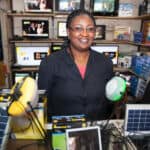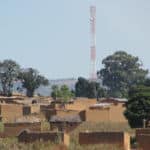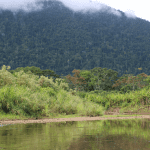Empowering Women to Fight Climate Change: A Program in Zambia Shows How Smallholder Farmers Can Lead the Way
The rainy season doesn’t always come to Zambia like it used to. In the last two years, when the rains have begun, they haven’t lasted long, and they’ve done little to quench the dusty fields. “The drought has really impacted us farmers,” says Inutu Musialela, 53. “We planted crops like maize and sunflower, but the rains ended, and the crops didn’t grow.”
In the 12 years that Musialela has worked as a “farm business advisor” (FBA), training other farmers on modern agricultural techniques and selling them supplies, she says the climate has changed significantly. Before, she told them to plant crops in rows, use fertilizer and protect their plants from pests. Now she spends just as much time showing them how to adapt to climate change, telling them to plant early maturing crops that require less water, or explaining that they should diversify what they plant in case some varieties fail.
Musialela is one of more than 300 FBAs – many of them women – trained in Zambia by U.S. business-minded nonprofit International Development Enterprises (iDE). Our training incentivizes the FBAs to teach other farmers how to run their farms as businesses, and how to use climate-smart agricultural practices to boost productivity. For instance, FBAs demonstrate the benefits of drip irrigation, dry mulching and hybrid seeds which sprout drought-resistant, high-yield crops. FBAs also link rural farmers with last-mile input suppliers and bulk produce buyers, reducing the time and money farmers ordinarily spend traveling to and from urban centers to sell their crops and access supplies.
Musialela’s experience illustrates how targeted support for women — particularly smallholder farmers — can benefit households and communities as they navigate the challenges of warming climates. It also demonstrates the kind of impact market-based interventions can have in preparing women farmers to play a leading role in addressing the climate crisis.
The Disproportionate Impact of Climate Change on Women and Other Marginalized Groups
Southern Africa has recently been impacted by persistent drought, erratic rainfall and other shocks, exacerbating food insecurity, extending the agricultural “lean season,” and increasing humanitarian needs for millions of people. Though these impacts affect everyone in the region, evidence shows that women and other marginalized groups are disproportionately impacted.
According to UN Women, the climate crisis isn’t “gender neutral.” Women and girls experience the greatest impacts, as droughts, heatwaves and other consequences of climate change amplify existing gender inequalities and pose new threats to women’s livelihoods, health and safety. As developing world communities are displaced and degraded by changing climates, women face increased incidence of gender-based violence, human trafficking, child marriage and other threats. Women farmers also face unique challenges, says the UN agency: “Agriculture is the most important employment sector for women in low- and lower-middle income countries. During periods of drought and erratic rainfall, women, as agricultural workers and primary procurers, work harder to secure income and resources for their families. This puts added pressure on girls, who often have to leave school to help their mothers manage the increased burden.”
According to the African Women’s Climate Adaptive Priorities (AWCAP) initiative, set up last year during the COP27 climate conference, women and children make up 80% of those needing assistance during humanitarian crises. And the initiative points to a report that found that poor women are 14 times more likely to be killed by a natural disaster than men. Moreover, existing inequalities facing women and girls limit their ability to transition to resilient water-energy-food systems, especially in the areas most affected by climate change. According to AWCAP, women represent just 15% of landowners in Africa yet produce 70% of the continent’s food. This presents a major challenge not only for women and their families, but for food security across the entire region.
Women Can Be Key Drivers of Agriculture and Climate Change Solutions
Yet despite these sobering statistics, there is some cause for optimism. It is well established that empowering women in agriculture can lead to economic benefits for women themselves, and for their households and communities. And when it comes to strengthening resilience to climate change, a growing body of evidence also suggests that women are key drivers of change. As Chiara Corazza, managing director of the Women’s Forum for the Economy and Society, says: “Our focus should not be on women as victims of climate change; rather on how they can be leaders, designers and implementers of solutions.”
For example, gender lens investment in women-owned or -led enterprises offers a powerful tool for enabling women to play this leading role. According to GenderSmart, a group dedicated to driving the use of gender-focused capital, a gender lens in agriculture typically focuses on “addressing the needs and challenges of women as agricultural producers and suppliers.” But a gender and climate lens can be applied in other ways that support farmers, including through investments in agricultural and food technology, fashion and other supply chains, and efforts to improve nutrition and increase the use of climate risk insurance and climate-resilient practices. GenderSmart points out that government pledges following the Paris Agreement provided an estimated $23 trillion in climate investment opportunity in emerging markets alone. With the growing awareness of the importance of focusing on women to maximize household returns and impact, there is potential for capital investment that empowers female farmers to rise above debilitating gender-based norms within their communities and become leaders in the global efforts to combat climate change.
Zambian Women Entrepreneurs Offer Proof of Concept for Climate Impact
In Zambia, iDE’s work has provided a proof of concept for the impact that women’s leadership in agriculture and climate resilience can make. We introduced Musialela to the British agricultural supply company Canon Garth, which has been operating in Southern Africa for decades. The company provides high-yield seeds to low-income farmers who don’t necessarily have the funds to pay for seeds to sow their fields. Canon Garth provides Musialela with groundnut seeds, which she, in turn, sells to the farmers she works with on credit. Farmers put down 50% of the price for a 20-kilogram bag, and the remainder is carried by Canon Garth as a loan — on the understanding that it will be repaid through Musialela once the harvest comes in.
Like all FBAs, Musialela offers these agricultural inputs and services as a small business entrepreneur. As a successful FBA, she has more than 3,000 customer farmers who follow her advice, buy her products, and help build resilient, inclusive and competitive market ecosystems — while providing her with a livelihood. If nonprofits, governments, community organizations and private investors work together to radically scale interventions like this one, with the goal of empowering small-scale women entrepreneurs like Musialela, we could unlock new sources of impact in emerging economies. As the world marks International Women’s Day, now is the time to consider how gender-specific programs could improve the lives of women farmers and their families, building climate-resilient food systems — and elevating women as leaders in the fight against climate change.
Simon Crittle is the Communications Director at iDE.
Photo: Inutu Musialela; credit: Chipema Chinyama
- Categories
- Agriculture, Environment



